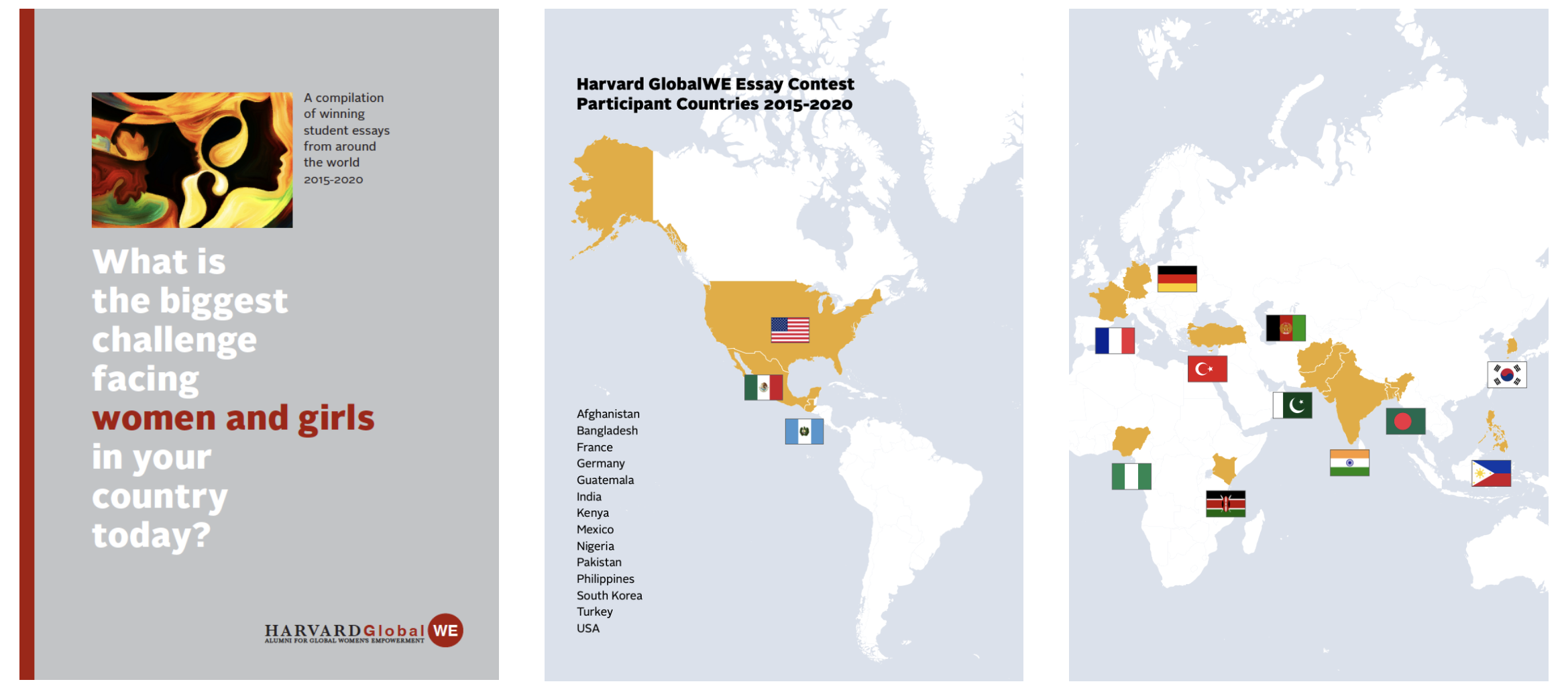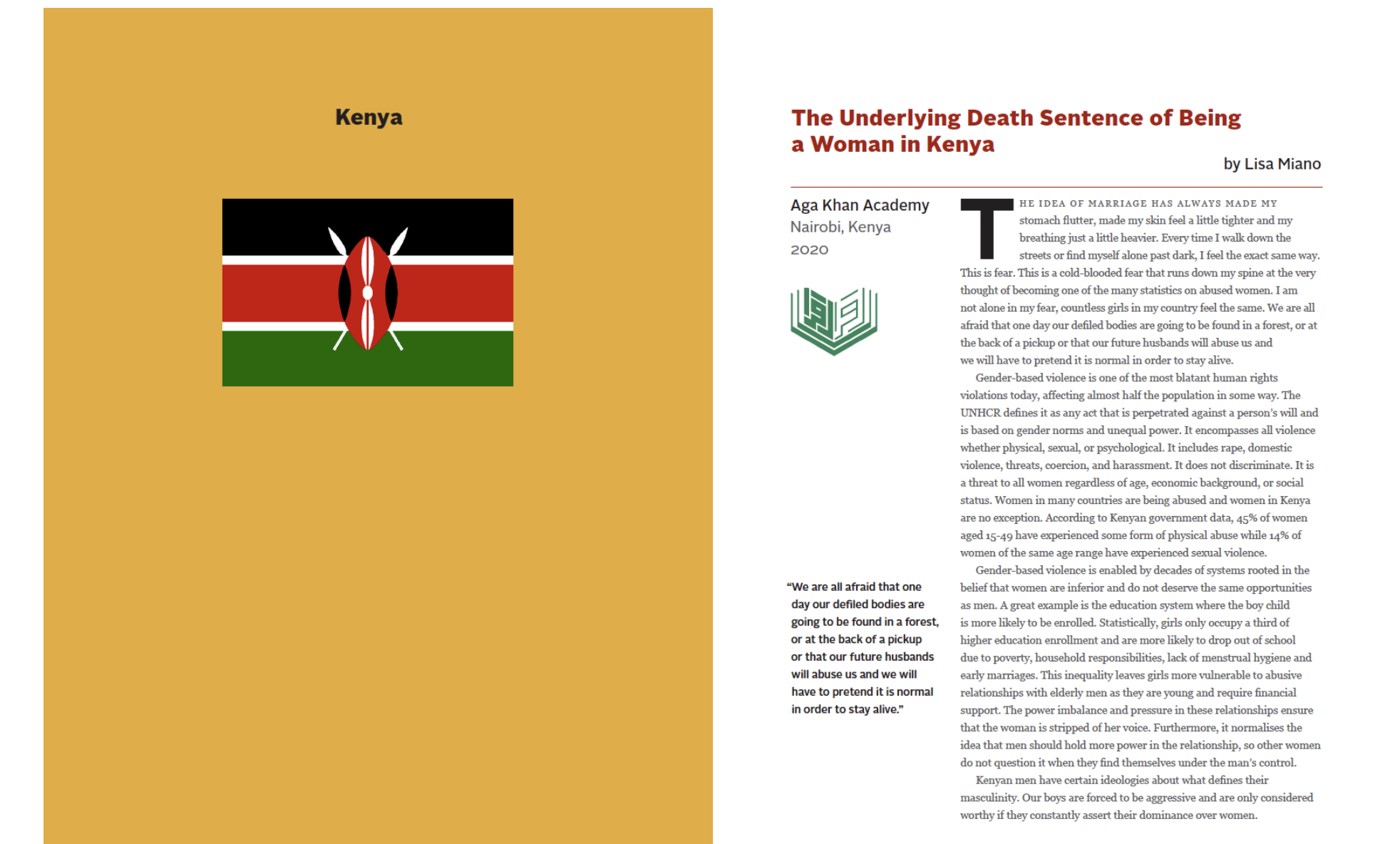According to studies, 65% of Egyptian girls and women over the age of 9 are illiterate. "Two million women in Egypt have never attended school; furthermore, the number of girls outside the educational system is twice that of boys," says Malak Zaalouk, director of the Middle East Institute at the American University in Cairo. To put it another way illiteracy represents one of the most significant challenges that Egyptian women face.
Read MoreNothing embodies the rags to riches trope like Singapore. In a few decades, our grandparents turned a tiny fishing village into one of the richest, safest and most productive countries on Earth. Our grandmothers pushed through countless obstacles in both the roles of a worker and a caregiver amidst poverty and the ubiquitous shadow of sexism, with their indomitable spirit living on in their daughters and granddaughters to this day. As such, women are not just expected to succeed, but also to excel. We call this mindset “kiasu” in Singlish, the Singaporean zeitgeist: an endless desire to strive for more to avoid falling short. In a city where sleep is simply a setting on a computer, Singaporean women face the unique challenge to perform at maximum efficacy in everything expected of them without weakness.
Read MoreThe journey of pregnancy should be one of elation, excitement, and exhilaration as a mother awaits the arrival of her newborn. It has no place for a company’s influence, where many view pregnant employees as a trammel to be cut off. Unfortunately in Singapore, pregnancy discrimination in workplaces continues to be a plague that impedes women’s progress in their careers.
Read More“I'm so sick of running as fast as I can, wondering if I'd get there quicker if I was a man.” These are two lines from Taylor Swift’s The Man. Now you may be asking, “is Taylor even Filipina?” Well no, but these lines from her song perfectly encapsulates what it is to be a woman regardless of where you live. Being a woman has always been a struggle, moreso in a conservative country like the Philippines. Facing countless inequalities on a daily basis, women have to work twice as hard to be leveled with men.
Read MoreA woman is to live for everyone but herself. By the Philippines’ standards, a woman can only ever be a virgin, a victim, a slut, a wife, or a mother. The timeline of her life starts and ends with her belonging to someone else.
Read MoreKnown as the home of the Black Nazarene, a life-sized image of Christ believed to hold miraculous healing powers, the Quiapo Church is often infested by swarms of devout Roman Catholic citizens. However, for many young Filipino women, the true life-saving miracle they desperately search for lies amongst the bustling grounds surrounding the church - the hotspot of lurking vendors offering various illegal abortion medications and practices.
Read MoreIt is an unfortunate reality that women of the Philippines still suffer from innumerable issues, so many that it is nigh impossible to write about them in a single essay alone. To eradicate them would require a change in people’s dispositions, especially men, and a complete restructuring of our system. So many of these problems have become so ingrained in our society and norms, that it is of the utmost importance we draw attention to them to begin picking these threads out of the woven tapestry of Filipino culture. Perhaps the largest of these issues is that of reproductive health and the access to contraceptives.
Read MoreWhispers of an unmarried woman in her forties slither down the grapevine, and the room erupts in pity. She had exhibited a striking talent, beauty, and brilliance from childhood, yet what a shame her life has become. It is with great sorrow that the community sympathizes with the misguidance of her scholarly education, the scandal of her successful career, and her crime of a pursued dream. She is too arrogant, a recluse, and ever-so conceited; it is of little surprise she could not secure a husband. She is my aunt, and she is my teacher, and she is my neighbor; my parents worry she would forever lead a hollow life. She is a stranger, she is a Filipino, and she is a failure.
Read MoreI once had a barbie doll, and never thought I’d be one too.
One humid morning amidst the ever-bustling streets of Manila, my older sister and I were running, hoping to catch the last jeepney with the route passing by our house. As we climbed up in the jeepney, I stealthily made my way to a vacant space while holding my above-the-knees jumper skirt down...
Read MoreThe gapped representation of Filipino women in the world of Science and Math has been intact since the 18th century. Women are still underrepresented in STEM fields, which is a problem for women's empowerment in the country. The concept of "Gender Stereotypes" imprinted itself in the mindsets of many generations. It affects the dreams and passions of children. It sets expectations that limit the potential growth of our next successors. Expectations that, in the eyes of society, determine what is suitable, ought, and standard for youths that will soon be part of the labor force. The limitation granted by this perspective on gender ends up being a hurdle for many students to achieve their desired purpose in society; they are either forced to stop due to inequality, belittled, or derailed from their passions because of discrimination, which weakened their capability to perform in the industry.
Read More“I complained last December, but until now, there hasn’t been any action,” whispered Juliet Manuales, an Overseas Filipino Worker (OFW). Manuales trembled as she hid in her employer’s bathroom, risking her life to make a video call - a desperate plea for help. Ever since she was hired as a domestic helper in Saudi Arabia, she has endured abuse: strangled twice, locked up, and cut from all communication channels. Despite facing threats of dismemberment and violence, she reported her abuse to her agency in December 2021. She was met with silence. It took 4 months, and another distress call for the Philippine Overseas Employment Administration (POEA) to save her.
Read MoreWith how gender equality and women's empowerment have emerged as popular topics lately, there have been improvements in the treatment of women by modern society. According to a 2022 World Bank blog “Overcoming Barriers to Women’s Work in the Philippines” by Helle Buchhave, the Philippines is the best performer of gender equality in East Asia and the Pacific Region. However, there are still a few forms of gender inequality arising in the country. In recent years, I have noticed that the biggest challenge women are facing in my country as well as worldwide is the lack of respect coming from men, fellow women, and themselves, which generates more problems such as violence, rape, degradation, and discrimination against women.
Read MoreMy insatiable curiosity as a seven-year-old led me to ask my mother why my surname was Fritsch-Fontanges. The question was well reasoned: combining two long surnames with atypical spelling is inconvenient. After all, why not only Fritsch, my father's name, or only Fontanges, my mother's? I could not understand why my parents kept both names, placing my father's first. To my inquiry, my mother answered, "Patriarcat." Though initially met with confusion, the word etched itself into my memory, becoming a slit into a gender-defined world. Still today, I ask myself: is it so unthinkable that a child does not keep his father's name? When will French society emancipate itself from patriarchy?
Read MoreShe was not allowed to wear clothes when she was born. She is not expected to do great in school. She is obliged to follow the ritual (He and Li 7) and filial piety. She is me and every girl raised in Chinese culture.
Read MoreThe biggest issue for women and girls in the United States is the way media and experiences as children teaches us we aren’t as capable.
In seventh grade, I was a part of the middle school basketball team. Each day after school, I would go to the locker room, change for practice, and go to the gym. In the middle of the gym was a dividing wall. This wall split the gym into 2 equal sections...
Read More“He smashed her face with his fists, breaking her nose, leaving multiple fractures, and causing her brain to bleed”. What in the world? I stared at the statement in shock and my eyes bulged with horror as I read the sentence in the Straits Times. When Ms Rachel Lim, then 25, refused
Read MoreMy mother was just 33 years old when she gave up her position of marketing director to raise her children. She, like countless other mothers in Singapore, choose to forsake their careers for their household. We must ask ourselves: is it really a choice? Although Singapore is regarded as a progressive first world country with high standards of living compared to many other countries, several challenges such as gender inequality are still faced, where women and girls are still prone to experience this issue in their lives.
Read MoreThe issue of women's rights has been a persistent concern in societies worldwide, and Singapore is no exception. Basic rights such as equality in the workplace, freedom from discrimination and violence, and access to healthcare are crucial for women's wellbeing. Unfortunately, the Gender Schema Theory contributes to the perception that women should conform to specific roles, which denies them these rights. As perceptions arguably shape actions, this theory influences individuals to impose traits deemed suitable for women, limiting their opportunities and perpetuating gender stereotypes. In Singapore, many issues confronting women such as job and leadership opportunities, and gender pay gap are fueled by this theory that exists in society today.
Read MoreIn a world where only the most tangible things can be characterised as real, as existing, we often forget that challenges can also come from within, from places which we easily ignore. In China, the greatest challenge that women and girls face is the language formed through the ancestral ideology: 「三從四德」1.
Read More“You are the dancing queen. Young and sweet. Only seventeen.”
Amidst the cacophony of off-key singing and crackling party poppers, I gently blew a gust of air towards the enormous cake, snuffing out the flickering candle in an instant. A great eruption of applause filled the room as beloved friends and family flooded towards me to exchange their congratulations. It was another momentous day for me — I finally became a dancing queen.
Read More

